June 26, 2023, marks the 130th anniversary of Illinois governor John Peter Altgeld pardoning three men who were wrongfully imprisoned for their connections to the Haymarket affair. In this blog post, CHM director of exhibitions Paul Durica discusses Altgeld, the incident at Haymarket, and its aftermath.
Sleep softly . . . eagle forgotten . . . under the stone.
Time has its way with you there, and the clay has its own.
“We have buried him now,” thought your foes, and in secret rejoiced.
They made a brave show of their mourning, their hatred unvoiced.
They had snarled at you, barked at you, foamed at you day after day,
Now you were ended. They praised you . . . and laid you away.
So begins “The Eagle that is Forgotten,” a poem by Vachel Lindsay about his “next-door neighbor” in Springfield, Illinois, from 1893–97. That neighbor, the forgotten eagle, was John Peter Altgeld (1847–1902)—the first Chicagoan to become governor of Illinois.
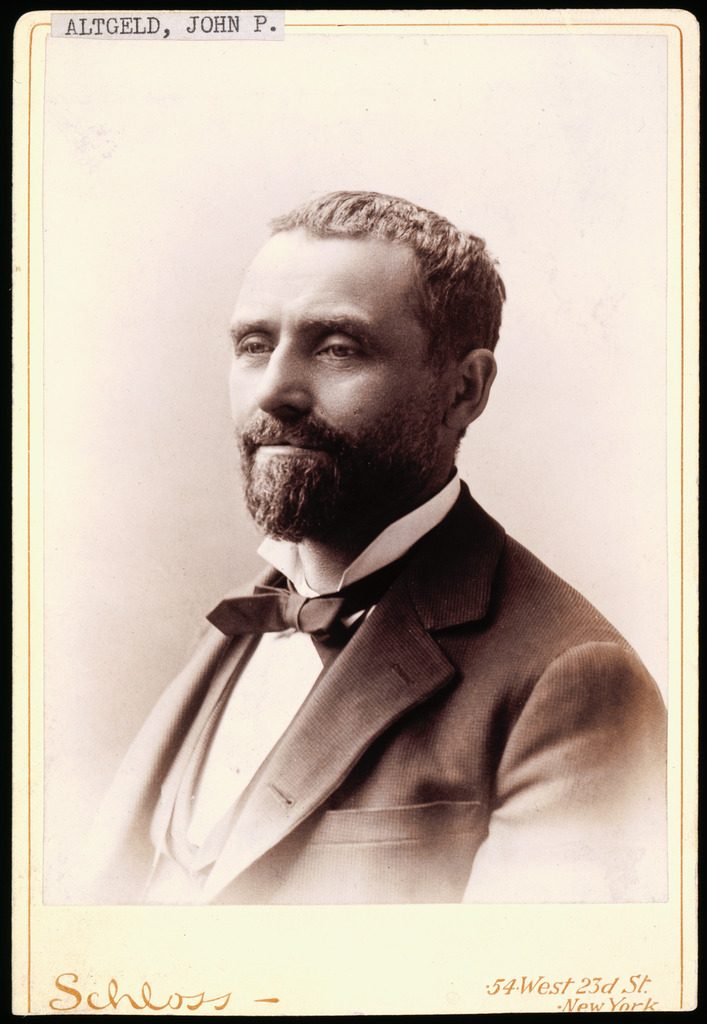
Portrait of John Peter Altgeld, c. 1893. CHM, ICHi-009404; Schloss, photographer
Born in the Duchy of Nassau, now the German states of Rhineland-Palatinate and Hesse, Altgeld was a lawyer and dabbler in real estate. He became a judge in 1887 with an interest in criminal justice reform. In 1892, Altgeld became the first Democratic governor of Illinois in more than 40 years.
As Lindsay’s poem describes it, Altgeld gave his enemies reason to snarl, bark, and foam at him until the end of his days. He decided to review the Haymarket case.
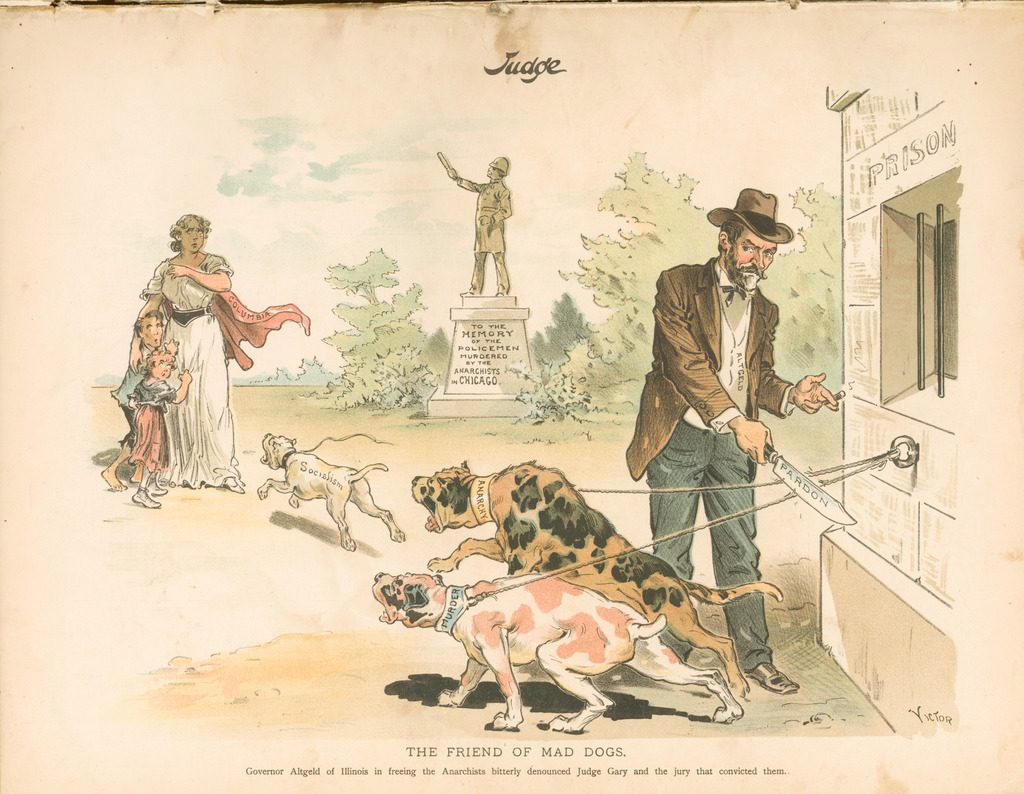
Cartoon titled “The Friend of Mad Dogs” showing Governor John Peter Altgeld releasing dogs (labeled Anarchy, Socialism, Murder) who run toward a woman and children. From Judge periodical, published by Judge Publishing Company in New York, New York, vol. 25, no. 613, July 15, 1893. Statue of Haymarket in background. Courtesy of the Chicago History Museum, ICHi-031336
The story begins the evening of May 4, 1886, when almost 3,000 Chicagoans gathered in the area known as the Haymarket to support an eight-hour workday and protest a previous act of police violence. As the peaceful gathering neared its end, almost 200 armed police marched into the crowd. Someone threw a bomb. One officer died instantly; seven others later succumbed to their wounds. Dozens of people were injured.
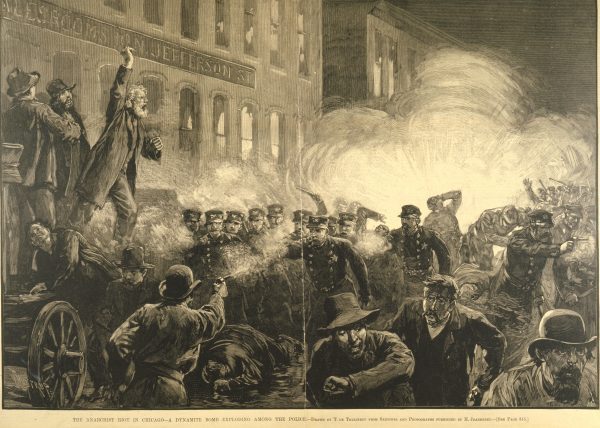
Illustration depicting the bomb detonating on May 4, 1886, published in Harper’s Weekly, May 15, 1886. Title reads “The anarchist riot in Chicago – a dynamite bomb exploding among the police.” CHM, ICHi-003665
A terrorist act of this kind had never occurred before, and the public panicked. Unable to identify the bomber, the state arrested and tried eight men, mostly foreign-born, who identified as socialists and anarchists and had been involved in the Haymarket gathering. Condemned for what they said and believed, Albert Parsons, August Spies, Adolph Fischer, and George Engel were hung; Louis Lingg died by suicide in prison; and Samuel Fielden, Michael Schwab, and Oscar Neebe went to the state penitentiary in Joliet.
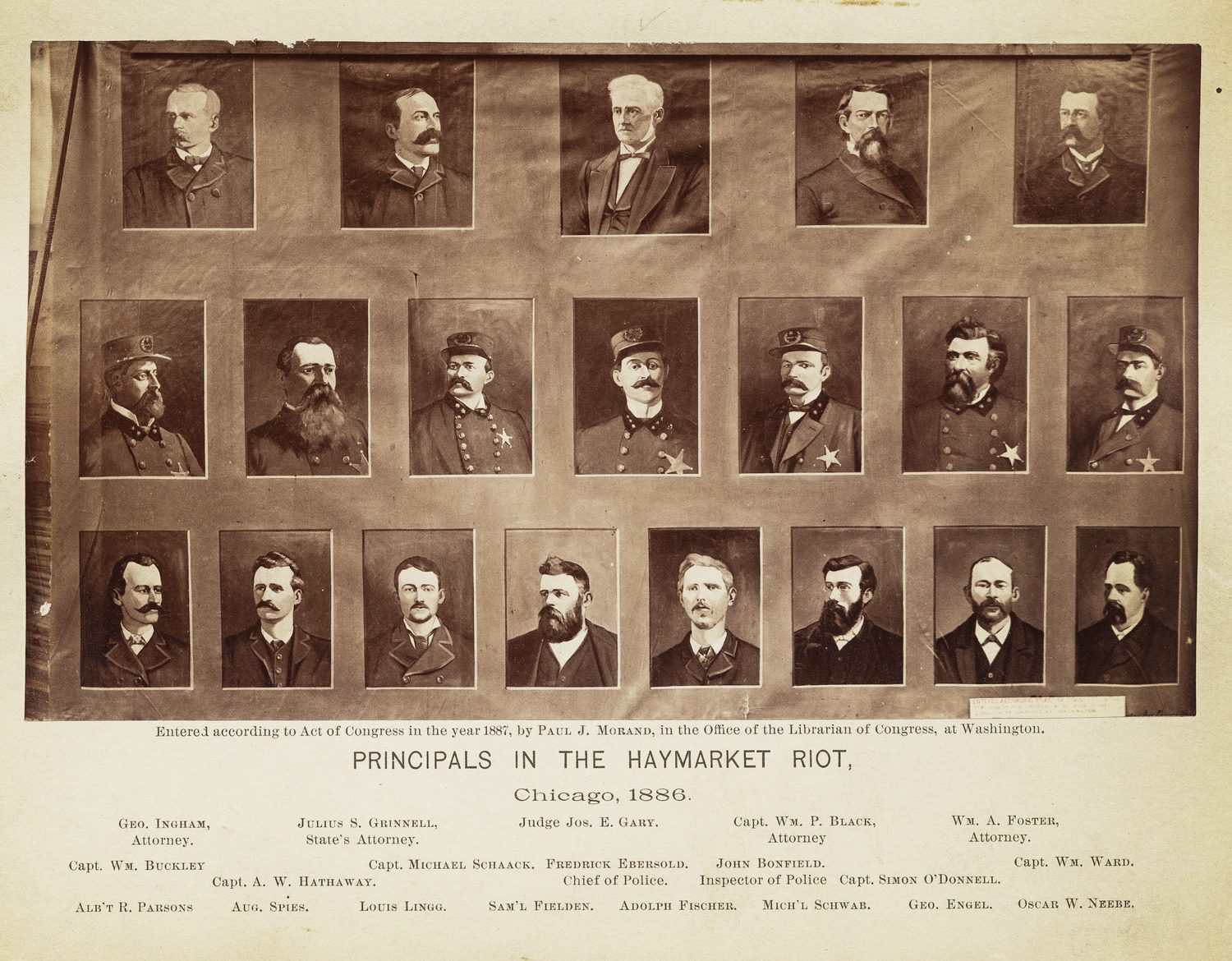
Photographic print titled “Principals in the Haymarket Riot” dated 1886 depicting the judge, attorneys, police, and defendants involved in the Haymarket Affair. CHM, ICHi-003678
Reviewing the court records, Altgeld determined that the Haymarket trial was biased against the defendants, the witnesses for the prosecution had perjured themselves, and the police had tampered with evidence.
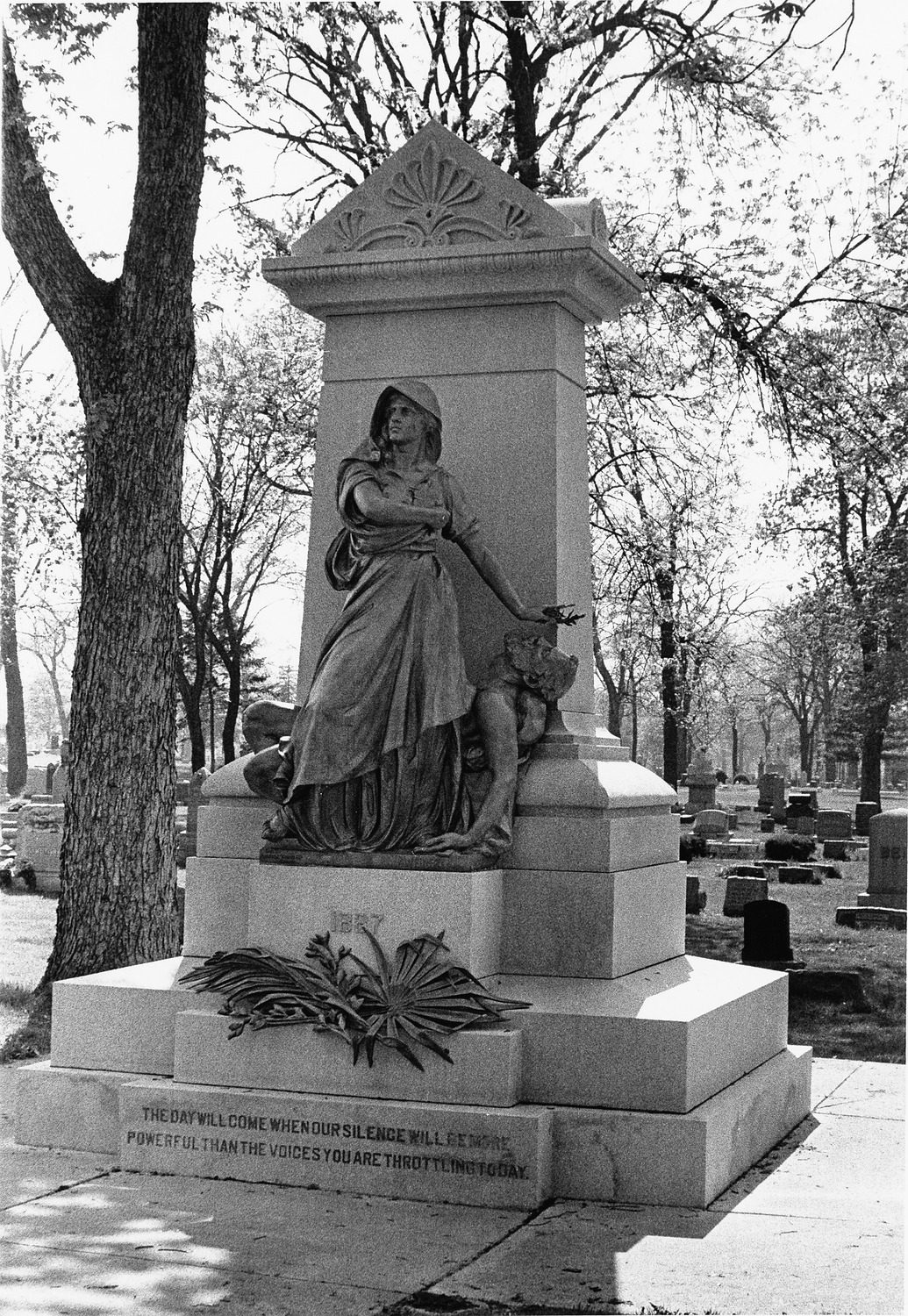
Undated photograph of the front of the Haymarket Martyrs’ Monument at Waldheim Cemetery (now Forest Home Cemetery), Forest Park, Illinois. The quote at the base reads: “The day will come when our silence will be more powerful than the voices you are throttling today.” CHM, ICHi-052313
“I will simply say in conclusion on this branch of the case that the facts tend to show that the bomb was thrown as an act of personal revenge,” Altgeld wrote, “and that the prosecution has never discovered who threw it, and the evidence utterly fails to show that the man who did throw it ever heard or read a word coming from the defendants.”
On June 26, 1893, Altgeld pardoned the men imprisoned in Joliet–Samuel Fielden, Michael Schwab, and Oscar Neebe.
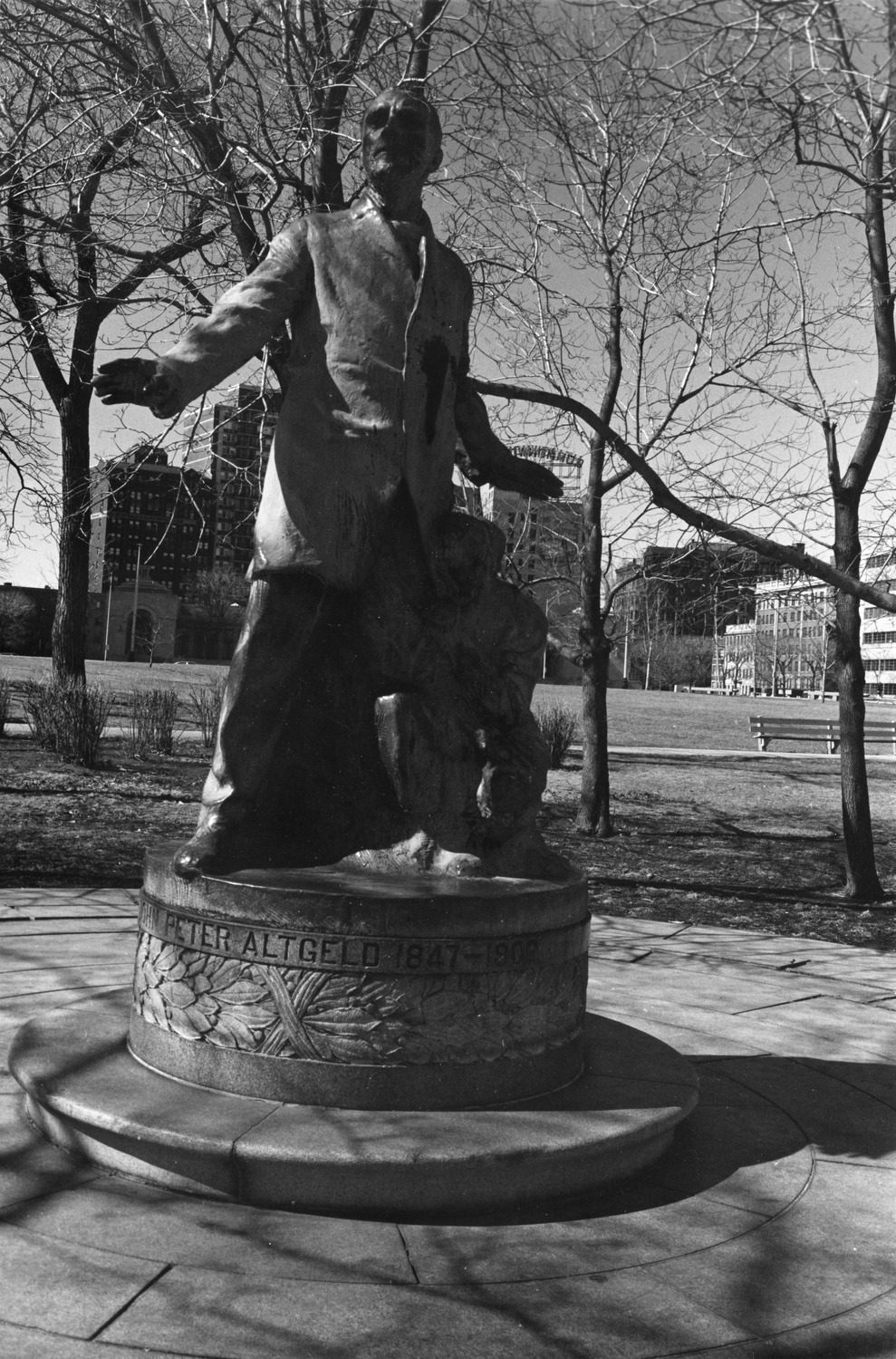
Statue of John Peter Altgeld by sculptor Gutzon Borglum in Lincoln Park near Diversey Avenue and Sheridan Road, Chicago, April 1975. CHM, ICHi-067212
This act of political courage, along with his support of workers during the 1894 Pullman Strike, ensured Altgeld’s reelection defeat. National attitudes did not match his personal values, but Altgeld would inspire other reformers like Jane Addams and his former aide Clarence Darrow. Upon Altgeld’s death in 1902, the always critical Chicago Tribune felt forced to conclude, “The hatred of his opponents was a tribute to his ability.”
Additional Resources
- Peruse The Dramas of Haymarket, an online project produced in partnership with Northwestern University that examines select materials from our extraordinary Haymarket holdings
- The Museum’s Chicago: Crossroads of America exhibition discusses the Haymarket affair in the City in Crisis section.